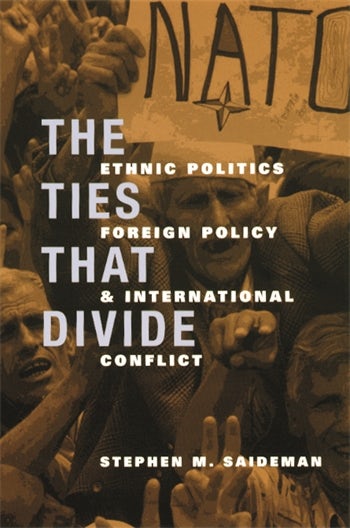 Yesterday, a twitter thread developed about people whining about their first books and why no one pays attention. Well, I haven't whined about The Ties That Divide in some time, so I felt I was due. cheap used, surprisingly not cheap kindle price). So, why should we care about that dusty volume?
Yesterday, a twitter thread developed about people whining about their first books and why no one pays attention. Well, I haven't whined about The Ties That Divide in some time, so I felt I was due. cheap used, surprisingly not cheap kindle price). So, why should we care about that dusty volume?That and because the book preceded this blog by about eight years, I never ruthlessly promoted it (
Because, damn it, it did not kill the conventional wisdom with fire:
I haven't read your book but the four introductions to African politics I've read for courses puts forth this explanation for the norm expressed in Article III of the OAU charter, and claiming that Somalia was the only explicitly irredentist state in Africa.— Greg Olsen (@gtotango) February 1, 2019
For gosh sake, jeez, Somalia might have been the only explicitly irredentist state in Africa at the time BUT African countries still did support secessionism on the continent AND Somalia was vulnerable to secession--Somaliland did not just happen out of nowhere.
I first started doubting this conventional wisdom when I noticed that vulnerability to separatism didn't stop either Pakistan or India from supporting separatists in their neighbors. I decided then to compare Africa to South Asia to find out why the norms developed in one place and not the other--it might say something about when Liberal arguments prevail and when Realist dynamics seem to matter more. Then I noticed that in each African secessionist crises, some countries supported secessionsts. Ooops. Sure, more supported the host state, but those supporting secessionists included those with their own secessionists. In the dissertation, I looked at the Congo Crisis of the early 1960s and the Nigerian Civil War as well as the secession of Bangladesh.
I also analyzed Somalia's behavior as the one irredentist country in Africa, and realized pretty quickly that Somalia had its own separatist issues. More obvious now with Somaliland, but even pretty obvious way back when as Northern and Southern Somalia were governed by different colonial powers, which is often a recipe for secessionism. Not to mention that the whole idea of Somalis being unified by a language and by religion and all that ignored deep clan divisions, which, again, became more obvious after 1991 but were always known to scholars of Somalia.
I dropped the creation of Bangladesh when I revised the dissertation into a book for two reasons: a) it was really about India and was not so comparable; and b) while I was working in my first job, a newer and more relevant country imploded so I could show how the dynamics applied not just in the 1960s in Africa but in the 1990s in Europe. So, Yugoslavia worked out as a case, where I again found countries willing to support separatism despite being vulnerable to it. Most notably, Croatia was supporting irredentists in Bosnia as it was combating Serbian irredentists in Croatia.
Oh, and another addition to the manuscript: quantitative analyses that showed that vulnerability to secession did not stop states from supporting secessionists. I published that separately at JPR and then tested it dyadically in a piece that was accused of plagiarizing Saideman but eventually got revised and published in CJPS (I can send interested parties PDFs of these pieces if you can't get beyond the gated access). Not only do the findings support my argument about ethnic ties mattering quite a bit, but that vulnerability is associated with more support, not less.
Anyhow, one of the questions about blogging is whether one should repeat what one has said before. The reluctance to do so has had an impact on my blogging--I don't blog as much as I used to. However, as some have reminded me, folks may not have read my earlier posts, and, of course, this also applies to earlier work. As a result, here I am post-promoting my first work, in part because the conventional wisdom about the international relations of secession is still, alas, conventional wisdom. Vulnerability does not deter support for separatists... not then and not now.
No comments:
Post a Comment